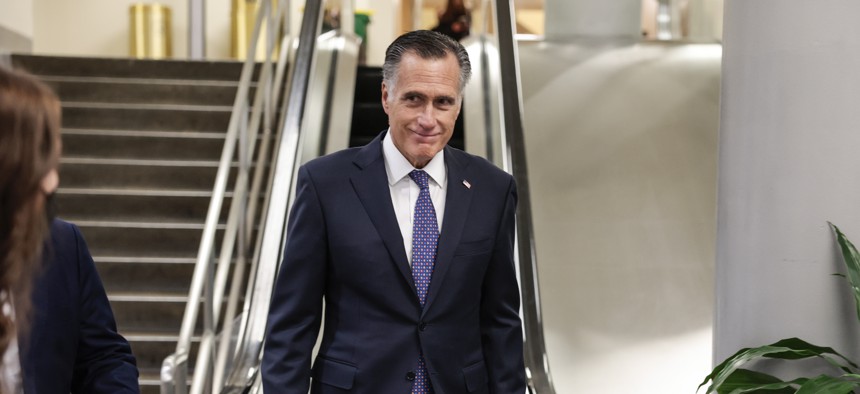Key Senator Indicates State ARPA Funds Takeback is Still on the Table

U.S. Senator Mitt Romney, a Utah Republican, at the U.S. Capitol. Getty Images
“Any of the funding is open for discussion,” U.S. Sen. Mitt Romney said as negotiators try to reach a deal over emergency Covid-19 funding that the Biden administration wants.
The lead Republican negotiator trying to reach a deal with Senate Democrats over $15 billion in new Covid-19 aid the Biden administration is urgently seeking signaled Wednesday that clawing back American Rescue Plan Act funds from states remains in play.
Funding for more Covid-19 tests and treatments “would all come from ARPA and CARES money that hasn't been spent yet,” Sen. Mitt Romney, of Utah, told reporters at the U.S. Capitol, reflecting Republicans' insistence that they would not agree to spend more on the emergency measures, and instead want to shift the dollars from other programs.
Asked if Senate Republicans have backed off proposals to take money from states, he indicated that the idea isn't dead yet.
“Any of the funding is open for discussion,” he said.
Romney added that the two sides continue to disagree on where they'll come up with the money. "We haven't settled that yet,” said Romney, referring to one-on-one talks he’s been having with Democratic Senate Majority Leader Chuck Schumer.
Concerns About State Spending
Romney, a former governor of Massachusetts, has raised concerns about how states and localities are spending ARPA funds, including in a March letter signed by three dozen Republicans. “Since the passage of the American Rescue Plan, questions are mounting about where exactly the additional money has gone," they wrote.
House Democrats, while negotiating the $1.5 trillion omnibus spending bill for the current fiscal year, initially agreed to Republican demands to take back ARPA dollars from states. A tentative agreement unveiled by House Speaker Nancy Pelosi would have raised about half of the requested Covid funds by rescinding around $7 billion of pandemic aid promised to 30 states with low unemployment.
The idea was pulled after Democratic lawmakers and state and local officials rebelled. Instead, Democrats in the House took the Covid-19 funding measure out of the larger bill and began negotiations over passing it as a separate measure.
States and localities, though, remain concerned funds could be clawed back.
Meanwhile, as the talks have dragged on, the administration has grown more anxious about getting the funding.
Dawn O'Connell, the Department of Health and Human Services’ assistant secretary for preparedness and response, told a House Covid-19 committee on Wednesday that the U.S. does not have enough money to buy additional vaccine doses.
“We do have significant concerns about whether we would have enough vaccine if we were to do a general population boost campaign in the fall, particularly if we’re going to need a variant-specific vaccine,” O’Connell told the House Select Committee on the Coronavirus Crisis.
Biden on Wednesday again also urged action. “Congress please act,” he said. “You have to act immediately. The consequences of inaction are severe; they will only grow with time.”
Schumer also stressed the urgency of reaching a deal, and said the Senate is poised to act quickly to approve the funding once there’s an agreement.
“The consequences of not getting Covid funding are really serious—scary, almost,” he said.
Still, Romney said the question remains how to pay for it. “They have a different point of view,” he said of Democrats. “They all have the same list of what's not been spent. So we all know the places that one can draw. We made a proposal of where you draw it. They have different points of view.”
Kery Murakami is a senior reporter for Route Fifty based in Washington, D.C.
NEXT STORY: Why Economists Called Gov. Kathy Hochul’s $850 Million Buffalo Bills Deal a ‘Boondoggle’






